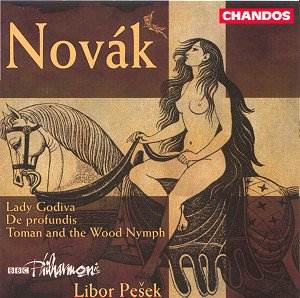VITEZSLAV NOVAK
(1870-1949)
Lady Godiva (1907) 17.09
Toman and the Wood Nymph (1906-7) 25.33
De Profundis (1943)
23.19
 BBCPO/Libor
Pesek
BBCPO/Libor
Pesek
 CHANDOS CHAN 9821
[66.22]
CHANDOS CHAN 9821
[66.22]
Crotchet

Novak has been a fascination of mine since picking up a secondhand copy of
the Supraphon LP of Karel Sejna conducting the tone poems In the Tatras
and About the Eternal Longing (since reissued on a Supraphon Crystal
CD). These are works of ambitious emotional scope, in the one case exploring
the high places in an ecstatic collision of Delius and Bax and in the other
a hymn driven by unrequited love, the sea and the moon. These are available
on a Supraphon CD 1106822 011. Not to be missed.
Libor Pesek, after many Supraphon discs, well and truly established his
credentials with a series of Virgin Classics discs in which (with the Royal
Liverpool PO) he conducted fine performances of the orchestral works of Novak's
countryman, Josef Suk - a composer who influenced Novak e.g. the echoes of
the Asrael Symphony at 4.31 on track 3 of Toman.
A switch to Chandos signalled by the present disc bodes well for a Novak
series. These are idiomatic performances with a Czech cutting edge.
The Lady Godiva story might seem more apt to light music than to the harrowing
tone poem written by Novak. As it is neither Novak nor Pesek pull punches
in a performance of scowling braggadocio and Delian romance. This is a deadly
serious and at times extremely exciting essay around the conflict between
Evil and Good. Bernard Herrmann might well have been influenced by the score.
Swooning strings, skittering harp arpeggios, and a grand romance also familiar
from Louis Glass's Fifth Symphony and Tchaikovsky Francesca da Rimini makes
this well worthwhile.
Toman is also extremely attractive in a clean impressionistic and often Gaelic
way. The score is rife with coincidences: Bax's Spring Fire, Nympholept,
Happy Forest, Sibelius Symphony No. 1, Dukas La Peri and George Butterworth's
Shropshire Lad.
De Profundis grumbles and throbs with deep bell tones - a sort of Czech
equivalent of Respighi's Church Windows. The world encompassed is similar
to the awesome chasm of the Bax Second Symphony and the opening of Miaskovsky's
Seventh Symphony. The raw and sober trumpets at 7.10 are noteworthy. The
work is high on gloom and short on hope. A wheezy homespun harmonium tone
for the largo gives way to a brief bitter and majestic peroration.
You will not find a better recording of these pieces and certainly there
is no identical coupling though the works are available individually scattered
across various Supraphon CDs.
Rob Barnett

